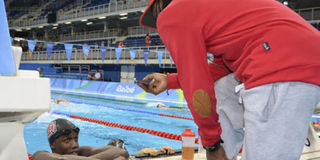Swimming in ascendency despite Olympics ‘no show’

Swimmer Joshua Ekirikubinza listens to coach Max Kanyerezi after a training session in Rio, Brazil before representing Uganda at the 2016 Olympics . FILE PHOTO
KAMPALA- After the comparative success of last year, 2016 started with much for the swimming fraternity.
Joshua Ekirikubinza’s personal bests at the World Championships in Kazan, Russia and Rebecca Ssengozi’s medals at the Africa Junior Championships in Egypt were fresh in our minds at the start of the year earning the latter the Female Swimmer of the Year (2015) at an awards gala in January.
Ekirikubinza’s reputation enhanced after joining Grinnell College, USA earlier in the raised expectation that he would break the 25.00 Personal Best he was clocking ahead of the Olympics in Brazil.
Jamila Lunkuse had been Uganda’s other hopeful in the year leading to Rio. She was two seconds off Olympic Selection Time (OST) in the 100m breaststroke (1:10.22) before Kazan, where she clocked 1:17.23. With experience earned over the years, including swimming at the 2012 Olympics, hope remained she would hit the qualification mark.
Unfortunately, her form took a nosedive largely because she joined a university where swimming was no priority.
Fortunately for Uganda, Fina (International Swimming Federation) allows wild cards, one spot per gender, for its member nations at the Olympics and World Championships.
The wild cards in the past went to Fina members whose swimmers couldn’t qualify on their own as a means of exposure. Today, because of television rights and the urge to make swimming more competitive, they are a reserve of the ‘fastest’ among slowest swimmers per event.
It could be argued earning one is an achievement in itself.
So when Lunkuse posted 01:19.6 to finish last in her heat in Rio there was no shock but regret about how much the nation did to prepare our athletes.
At a time when government and the relevant sports bodies were politicking over funds to aid athletes’ preparations, Lunkuse and Ekirikubinza were parting with Shs15,000 per day to sponsor their own – far from ideal – two-hour non-residential training at Hotel Africana.
Uganda isn’t facing the challenges alone; swimmers from South Africa, Tunisia, Zimbabwe, Singapore, Kenya among others are setting base in USA to make international medal brackets.
‘Breaking even’
The challenges in Uganda are not just limited to lack of funds (swimming got Shs5m from National Council of Sports for the first time), facilities, small pool of talent and the wanting political will of government to invest in sport.
“The interconnection between sport, science and nutrition makes things different. You can’t just compete by having talent alone,” Uganda Swimming Federation (USF) president Dr Donald Rukare, said explaining how far the world has come.
But while challenges abound, USF and its stakeholders soldier on a mostly through capacity building.
American coach Richard Powers has led the foreign coaches, including Rosa and Darren Murray, in trying to improve the standard of local coaches, now under Uganda Swimming Coaches Association (Usca) and strengthen the foundation for swimmers.
Peter Mugisha, Umar Mugalu and Max Kanyerezi were named Fina Officials for the period 2017-2019. Now that Fina only recognizes competitions where its officials are officiating, the development couldn’t be timelier.
In the pool Nabil Saleh led Uganda’s charges as they won 11 medals at the second edition of the Cana Zone IV Championships in Mauritius in May.
Nicholas Malan’s gold in open water swimming, Ben Kaganda, bronze (100m backstroke) and Selina Katumba’s silver (200m freestyle) plus bronze (100m backstroke) momentarily debunked the notion that local swimmers have to go abroad to make notable strides – at least on the continent.
In November, Uganda’s entirely home grown sqaud won 18 gold, 31 silver and 24 bronze medals at the Cana Zone III Championships in Rwanda while Mudanye went on to make a memorable bow at the World Championship in Windsor – Canada where she beat three of her entry times.
Locally, the Seals League, where one gala is held in every quarter of the year with emphasis on individual performances across the various age groups offering mostly middle distance and long distance races, continues to be the flagship event attracting over 200 swimmers this year.
2016 in Summary
January
*USF hold inaugural awards gala.
February
Dolphins collect 23 gold, 16 silver and eight bronze medals in Nairobi at the Kenya Open Age Group and Relay Longcourse Championships.
March
Hosts Greenhill Academy win second successive USF National Secondary Schools Championship.
April
-Seals’ Zara Nansubuga, Anthea Mudanye and Daya Meera Yalonda win medals in Level One and Two Championship – South Africa.
-Lugave win inaugural Empaka Zo Kuwuga Mu Bika at Kampala Parents School (KPS) – Naguru.
May
-Uganda win 10 medals at the Cana Zone IV Championships in Mauritius.
- Daffodils win USF Midland National Primary Schools Gala at Rainbow International School.
- Dolphins win fifth successive crown in the Kenya Junior Championships – Nairobi.
June
-Seals win USF Club Championships at Kampala International School of Uganda (KISU).
-Seals and Dolphins tie (905points) to win second edition of the Seals Invitational Gala at KPS.
October
Aga Khan School win Excel Insurance National Independence Swimming Gala at KPS.
November
-Former Seals, Silverfin and Team Uganda coach Chisela ‘Spike’ Kanchela dies in Dubai.
-Uganda win 18 gold, 31 silver and 24 bronze medals at the Cana Zone III Championships in Rwanda.
December
Anthea Mudanye and Arnold Kisulo represent Uganda at the World Shortcourse Championship in Windsor – Canada. Nana Nakiddu and Tony Kasujja also attend medical and coaching clinics respectively.




